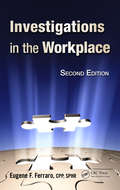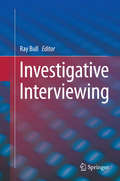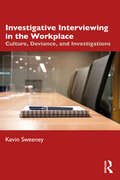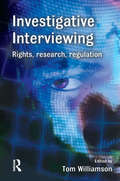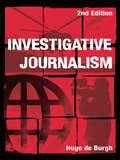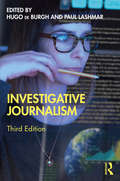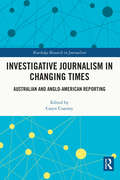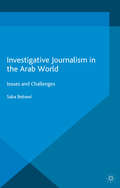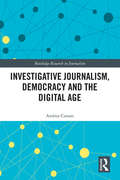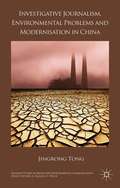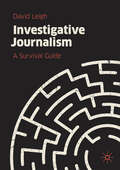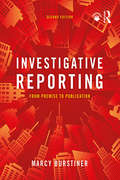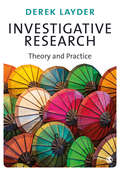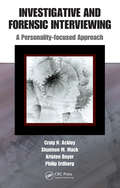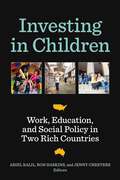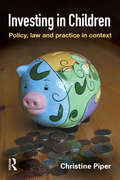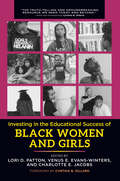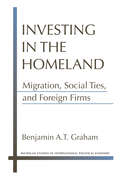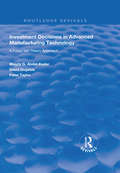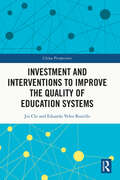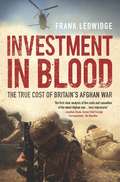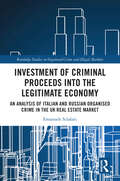- Table View
- List View
Investigations in the Workplace
by Eugene F. Ferraro Ban Seng Choo T.J. MacGinleyThe process of investigation is dynamic and fluid. The approach must be reasonable and the investigator flexible. However, in order to be successful, every investigation must have a meaningful purpose and be executed ethically and lawfully.Inevitably, employers must invest time, money, and patience to ensure they obtain demonstrable and actionable
Investigative Interviewing
by Ray BullThis edited volume reviews the latest research on investigative interviewing in order to provide insights on the psychological processes of the person being interviewed as well as to offer guidelines for conducting credible and useful interviews. Critical and controversial areas are highlighted (eg. false confessions, child interviewing) in order to bring clarity to how these interrogations are to be conducted. Chapters focus on these areas to provide comprehensive views of theoretical, evidence-based background, as well as practical considerations of interrogation settings and procedures. The contributors are internationally respected scholars in the field of psychology and law with particular expertise in the interviews that are critical to legal proceedings. And attention is given to the criminal justice system in international perspective.
Investigative Interviewing in the Workplace: Culture, Deviance, and Investigations
by Kevin SweeneyBased on extensive interdisciplinary research and the author’s over 30 years of experience in the field, this book provides best practice skills for auditors and investigators in any type of investigation and adapts them to ensure they are relevant to a corporate environment where the powers available to police are absent. In addition to providing technical skills and practical advice on investigative interviewing, former police investigator Kevin Sweeney explains how to analyze information to assist in the investigation and to identify emerging trends to provide opportunities to prevent problems before they occur. Readers will come to understand legal concepts such as the chain of evidence, the psychological factors involved in questioning, and the sociological factors that can help to build a macro understanding of the organization and the event in question. This book will become an essential resource for professionals involved in auditing or investigation work of any type in the corporate or public sectors, in contexts including human resources, employee relation investigations, auditing, or where criminal activity is suspected.
Investigative Interviewing: Current Developments And Future Directions
by Tom WilliamsonThe objective of this book is to review the position of investigative interviewing in a variety of different countries, with different types of criminal justice systems, and consists of chapters written by leading authorities in the field, both academics and practitioners. A wide range of often controversial questions are addressed, including issues raised by the treatment of detainees at Guantanamo Bay, The Reid model for interviewing and miscarriages of justice, the role of legislation in preventing bad practice, the effectiveness of ethical interviewing, investigative interviewing and human rights, responses to miscarriages of justice, and the likely future of investigative interviewing. The book also makes comparisons between British and American approaches to detention without trial, and the role of confession evidence within adversarial legal systems. It also develops a set of proposals to minimise the risks of miscarriages of justice, irrespective of jurisdiction.
Investigative Interviewing: Psychology, Method and Practice
by SPHR), Eugene Ferraro (CPPThere are few skills more important to the modern fact finder than the ability to obtain information through effective interviewing. While most interviewing books are intended for law enforcement, they often present harsh and accusatory techniques that can be counterproductive in private sector investigations.Investigative Interviewing: Psychology,
Investigative Journalism
by Hugo De BurghPraise for the first edition: ‘A surprising book. I’m surprised that it hasn’t been done before, and I’d also be surprised if anyone did it better.’– Roger Cook, The Cook Report, Central Television ‘A book that no aspiring student of the subject can do without.’ – Jon Snow, Channel 4 News Investigative journalism has helped bring down governments, imprison politicians, trigger legislation, reveal miscarriages of justice and shame corporations. Even today, when much of the media colludes with power and when viciousness and sensationalism are staples of formerly high-minded media, investigative journalists can stand up for the powerless, the exploited, the truth. Investigative Journalism provides an unrivalled introduction to this vital part of our social life: its origins, the men and women who established its norms and its achievements in the last decades. Two chapters describe the relationships with the law, bringing us up to date, and others deal with the professional techniques, the sociology and the teaching of investigative journalism. A further new chapter examines the influence of the blogosphere on investigative journalism. The case studies of the first edition have been supplemented by new chapters: the investigators and methods which revealed the subcontracting of the torture of Iraqi prisoners; how the murder of Stephen Lawrence was treated in the Daily Mail; the tabloids and their investigations; BBC Panorama.
Investigative Journalism
by Hugo de Burgh; Paul LashmarThis third edition maps the new world of investigative journalism, where technology and globalisation have connected and energised journalists, whistle-blowers and the latest players, with far-reaching consequences for politics and business worldwide. In this new edition, expert contributors demonstrate how crowdsourcing, big data, globalisation of information, and changes in media ownership and funding have escalated the impact of investigative journalists. The book includes case studies of investigative journalism from around the world, including the exposure of EU corruption, the destruction of the Malaysian environment, and investigations in China, Poland and Turkey. From Ibero-America to Nigeria, India to the Arab world, investigative journalists intensify their countries’ evolution by inquisition and revelation. This new edition reveals how investigative journalism has gone digital and global. Investigative Journalism is essential for all those intending to master global politics, international relations, media and justice in the 21st century.
Investigative Journalism in Changing Times: Australian and Anglo-American Reporting (Routledge Research in Journalism)
by Caryn CoatneyThis book offers new insights into the crucial role of investigative journalism at a pivotal time of technological changes and upheavals. It surveys innovations and unexpected impacts of the field, from past and present challenges, and what may be in store for the future of the industry. The book begins by exploring the increasingly investigative innovations in political and independent reporting, along with a comparison of the rhetoric and reality of a so-called "golden era" of investigative journalism in the past and the present. It goes on to analyse the growth of creative and sports investigative reporting, as well as the ability of contemporary conflict journalism to overcome surmounting challenges. It also examines the capacity of groundbreaking investigations, including data reporting, to expose injustices involving women, indigenous communities and other minorities. In interviews with key industry and research professionals, this book presents the reactions of four media experts to the crises faced by investigative journalism in a digital environment of escalating disinformation, legal restrictions and popular interest in the news. The book concludes by reflecting on previous and current challenges and offers insights into the prospect for investigative journalism of the future. Presenting unique views on the diversity, resilience and transformative power of investigative journalism, this book will be a valuable resource to students and scholars of journalism, communication, media and politics, as well as professionals already operating within the field of journalism.
Investigative Journalism in the Arab World: Issues and Challenges (Palgrave Studies in Communication for Social Change)
by Saba BebawiThis is the first book that looks into the state and role of investigate journalism in the Arab world. It explores the vital role the media could potentially play in informing and empowering society, to assist in opening up the communicative space in a region where this has previously been taboo.
Investigative Journalism, Democracy and the Digital Age (Routledge Research in Journalism)
by Andrea CarsonTheoretically grounded and using quantitative data spanning more than 50 years together with qualitative research, this book examines investigative journalism’s role in liberal democracies in the past and in the digital age. In its ideal form, investigative reporting provides a check on power in society and therefore can strengthen democratic accountability. The capacity is important to address now because the political and economic environment for journalism has changed substantially in recent decades. In particular, the commercialization of the Internet has disrupted the business model of traditional media outlets and the ways news content is gathered and disseminated. Despite these disruptions, this book’s central aim is to demonstrate using empirical research that investigative journalism is not in fact in decline in developed economies, as is often feared.
Investigative Journalism, Environmental Problems and Modernisation in China
by Jingrong TongThis book examines how the news media in general, and investigative journalism in particular, interprets environmental problems and how those interpretations contribute to the shaping of a discourse of risk that can compete against the omnipresent and hegemonic discourse of modernisation in Chinese society.
Investigative Journalism: A Survival Guide
by David LeighAt a time of hyper-partisanship, media fragmentation and "fake news", the work of investigative journalism has never been more important. This book explores the history and art of investigative journalism, and explains how to deal with legal bullies, crooked politicians, media bosses, big business and intelligence agencies; how to withstand conspiracy theories; and how to work collaboratively across borders in the new age of data journalism. It also provides a fascinating first-hand account of the work that went into breaking major news stories including WikiLeaks and the Edward Snowden affair.Drawing on over 40 years of experience with world-leading investigative teams at newspapers including the Guardian and The Washington Post, award-winning journalist David Leigh provides an illuminating insight into some of the biggest news events of the 20th and 21st centuries. This book is essential reading for anyone interested in the behind-the-scenes work of journalists and news organizations. It also acts as an essential practical toolkit for both aspiring and established investigative journalists.
Investigative Reporting: From Premise to Publication
by Marcy BurstinerInvestigative Reporting provides a step-by-step approach for tackling any investigative story, teaching reporters the skills they need to overcome common obstacles during investigative work. Experienced reporter and instructor, Marcy Burstiner offers readers guidance on how to identify story ideas, craft a premise, seek out human sources and documents, file public records requests, and analyze data. Including tips and advice from student and professional reporters, this comprehensive textbook also offers strategies for conducting interviews and for organizing information into a compelling story or series of stories that engage the reader through multimedia storytelling. Highlights of the new edition include: Updated examples and anatomies of news stories. Extensive discussion of data reporting and analysis for investigative projects. Guidance on how to request public records using state public records acts and how to appeal denials of public records requests. Instruction on the use of free, collaborative tools for organizing, sharing and analyzing information. A new chapter on creating a fact-checking system. A section on careers in investigative journalism. Interviews with student investigative reporters from colleges across the country, with professional investigative reporters from non-profit news organizations, emerging journalistic outlets and advocacy publications, and with staff and freelance reporters who produce stories for mainstream radio, television, print and online news organizations.
Investigative Research: Theory and Practice
by Professor Derek LayderWith its unique modelling and mapping of social processes, Investigative Research offers an alternative approach to social research. This book guides you through the theoretical grounding and rules you need to effectively combine the evidence-based explanations of social behaviour and distinctive strategies of data collection associated with investigative research. It helps you answer key investigative questions like: How are models and maps of social reality crucial to the formulation of research problems and questions? What are the main phases, challenges, and theories of investigative research? How does investigative research compare with other research approaches, like surveys, case studies, grounded theory, and mixed methods? How can you control the quality and validity of your investigative research? With its clear focus on investigative research exploration, description, and explanation, this book gives you the solid building blocks needed to manage and integrate the theoretical and practical issues in your work.
Investigative Research: Theory and Practice
by Professor Derek LayderWith its unique modelling and mapping of social processes, Investigative Research offers an alternative approach to social research. This book guides you through the theoretical grounding and rules you need to effectively combine the evidence-based explanations of social behaviour and distinctive strategies of data collection associated with investigative research. It helps you answer key investigative questions like: How are models and maps of social reality crucial to the formulation of research problems and questions? What are the main phases, challenges, and theories of investigative research? How does investigative research compare with other research approaches, like surveys, case studies, grounded theory, and mixed methods? How can you control the quality and validity of your investigative research? With its clear focus on investigative research exploration, description, and explanation, this book gives you the solid building blocks needed to manage and integrate the theoretical and practical issues in your work.
Investigative and Forensic Interviewing: A Personality-focused Approach
by Philip Erdberg Craig N. Ackley Shannon M. Mack Kristen BeyerInvestigative and Forensic Interviewing: A Personality-Focused Approach looks at the personality styles most commonly encountered in the criminal justice system and demonstrates how to use this insight to plan and conduct a productive interview. The book includes chapters on narcissistic, antisocial, psychopathic, borderline, inadequate/immature, p
Investing in Children
by Ron Haskins Jenny Chesters Ariel KalilInvesting in Children: Work, Education, and Social Policy in Two Rich Countries presents new research by leading scholars in Australia and the United States on economic factors that influence children's development and the respective social policies that the two nations have designed to boost human capital development.The volume is organized around three major issues: parental employment, early childhood education and child care, and postsecondary education. All three issues are intimately linked with human capital development. Since both Australia and the United States have created extensive policies to address these three issues, there is potential for each to learn from the other's experiences and policies. This volume helps fulfill that potential.The authors demonstrate that in both nations, the effects of low family income and income inequality emerge early in life and persist. However, policies that increase parental employment, augment family income, and promote quality preschool and postsecondary education can boost children's development and at least partially offset the negative developmental effects of family economic disadvantage.
Investing in Children
by Ron Haskins Jenny Chesters Ariel KalilInvesting in Children: Work, Education, and Social Policy in Two Rich Countries presents new research by leading scholars in Australia and the United States on economic factors that influence children's development and the respective social policies that the two nations have designed to boost human capital development.The volume is organized around three major issues: parental employment, early childhood education and child care, and postsecondary education. All three issues are intimately linked with human capital development. Since both Australia and the United States have created extensive policies to address these three issues, there is potential for each to learn from the other's experiences and policies. This volume helps fulfill that potential.The authors demonstrate that in both nations, the effects of low family income and income inequality emerge early in life and persist. However, policies that increase parental employment, augment family income, and promote quality preschool and postsecondary education can boost children's development and at least partially offset the negative developmental effects of family economic disadvantage.
Investing in Children: Policy, Law and Practice in Practice
by Christine PiperThis book brings together insights from a range of disciplines, including law, sociology, criminology and history, to identify and explain the complex and inter-related factors which help or hinder the state to 'invest' in children and young people. The first part of the book examines the 'intangibles' - the ideologies, social constructions and moral precepts - which obstruct or encourage the passage and full implementation of legislation, policy and practice which hopes to improve the lives and prospects of children and young people. Notions of family and parental responsibility, assumptions about what children and young people 'are' and the extent to which they should be held accountable, and ideas around state investment against future risks are the key factors considered. The second part of the book focuses on the difficulties in practice of implementing policies aimed at investing in children's lives and futures. It reviews the role of science in the identification of risk factors related to poor outcomes for children and in the selection of target groups or areas for risk-based intervention to provide (early) support and preventative programmes for children and their families. It also assesses whether and how law does or could help to 'deliver' an appropriate investment of time and money in children, with a focus on the existence and effectiveness of a rights-based approach. The final chapters examine the results of research so far undertaken done on selected programmes in the Every Child Matters, social inclusion and Youth Justice Board policy agendas and they indentify promising developments. However, they also draw attention to the alternative agendas around children and young people which are competing for government money and the public's support and warn that there are dangers in a child-focused policy whose justification relies so heavily on future cost savings stemming from the production of healthier, more employable and law-abiding adults.
Investing in the Educational Success of Black Women and Girls
by Lori D. Patton Venus E. Evans-Winters Charlotte E. Jacobs“In the powerful essays that make up Investing in the Educational Success of Black Women and Girls, Black women and girls are listened to, appreciated and valued in recognition of the unrelenting challenges to our existence in a world that continues to be committed to stifling our voices. What these authors know intimately is that such stifling is not because what Black women and girls are saying isn’t important: It is precisely because it is. This book names the challenges Black women and girls continue to experience as we pursue our education and offers implications and recommendations for practitioners, teachers, administrators, and policymakers. [It] needs to be read widely and deeply studied as much for its formations and beautiful representations of Black women and girls as its recommendations. It is the truth-telling we need today and a groundbreaking resource we need today and beyond.”—Cynthia B. Dillard (Nana Mansa II of Mpeasem, Ghana), Athens, Georgia; and Cape Coast, Central Region, GhanaWhile figures on Black women and girls’ degree attainment suggest that as a group they are achieving in society, the reality is that their experiences are far from monolithic, that the educational system from early on and through college imposes barriers and inequities, pushing many out of school, criminalizing their behavior, and leading to a high rate of incarceration.The purpose of this book is to illuminate scholarship on Black women and girls throughout the educational pipeline. The contributors--all Black women educators, scholars, and advocates--name the challenges Black women and girls face while pursuing their education as well as offer implications and recommendations for practitioners, policymakers, teachers, and administrators to consider in ensuring the success of Black women and girls.This book is divided into four sections, each identifying the barriers Black girls and women encounter at the stages of their education and offering strategies to promote their success and agency within and beyond educational contexts.In Part One, the contributors explore the importance of mattering for Black girls in terms of redefining success and joy; centering Black girl literacy pedagogies that encourage them to thrive; examining how to make STEM more accessible to them; and recounting how Black girls’ emotions and emotional literacy can either disempower them or promote their sense of agency to navigate educational contexts.Part Two uncovers the violence directed toward and the criminalization of Black women and girls, and how they are situated in educational and justice systems that collude to fail them. The contributors address incarceration and the process of rehabilitation and reentry; the outcomes of disciplinary action in schools on women who pursue college; and describe how the erasure and disregard of Black women and girls leaves them absent from the educational policies that deeply affect their lives and wellbeing.Part Three focuses on how Black women are left to navigate without resources that could make their collegiate pathways smoother; covers how hair politics impact their acceptance in college leadership roles, particularly at HBCUs; illuminates the importance of social/emotional and mental health for Black undergraduate women and the lack of adequate resources; and explores how women with disabilities navigate higher education.The final part of this book describes transformative approaches to supporting the educational needs of Black women and girls, including the use of a politicized ethic of care, intergenerational love and dialogue, and constructing communities, including digital environments, to ensure they thrive through their education and beyond.
Investing in the Homeland: Migration, Social Ties, and Foreign Firms (Michigan Studies In International Political Economy)
by Benjamin A.T. GrahamOnce viewed as a “brain drain,” migrants are increasingly viewed as a resource for promoting economic development back in their home countries. In Investing in the Homeland, Benjamin Graham finds that diasporans—migrants and their descendants—play a critical role in linking foreign firms to social networks in developing countries, allowing firms to flourish even in challenging political environments most foreign investors shun. Graham’s analysis draws on new data from face-to-face interviews with the managers of over 450 foreign firms operating in two developing countries: Georgia and the Philippines. Diaspora-owned and diaspora-managed firms are better connected than other foreign firms and they use social ties to resolve disputes and influence government policy. At the same time, Graham shows that diaspora-affiliated firms are no more socially responsible than their purely foreign peers—at root, they are profit-seeking enterprises, not development NGOs. Graham identifies implications for policymakers seeking to capture the development potential of diaspora investment and for managers of multinational firms who want to harness diasporans as a source of sustained competitive advantage.
Investment Decisions in Advanced Manufacturing Technology: A Fuzzy Set Theory Approach (Routledge Revivals)
by Peter Taylor Magdy G. Abdel-Kader David DugdaleFirst published in 1998, this volume was designed to lead to an operational model of Advanced Manufacturing Technology (AMT) decision making which incorporated the mathematics of fuzzy set theory. The rapid advancement of robotics, automated technologies and software such as CAD and CAM have made such studies paramount. Here, analyses of a questionnaire survey and field study of major UK manufacturing companies together provide a simulating portrayal of AMT investment decision making and have been expanded upon with a model using fuzzy set theory.
Investment and Interventions to Improve the Quality of Education Systems (China Perspectives)
by Jin Chi Eduardo Velez BustilloQuality improvement is a major current goal of Education in China and this will be achieved through overall quality improvement of the education system as a whole, a situation that is also the case across the world. Deploying a cost-benefit analysis and multidisciplinary perspectives from education, economics, neurocognition, gender studies, child development, and international development, this book presents a range of critical interventions in education development and investment that have proven to be effective in many countries around the world. The book draws on theoretical and practical experience in the field of education investment and analyses key issues in China's early childhood education, early reading, girls' education, brain science application in international education, small-scale schools in low income areas and teacher education. Students and scholars of education and development and Chinese education will benefit from this title.
Investment in Blood
by Frank LedwidgeIn this follow-up to his much-praised book "Losing Small Wars: British Military Failure in Iraq and Afghanistan," Frank Ledwidge argues that Britain has paid a heavy cost - both financially and in human terms - for its involvement in the Afghanistan war. Ledwidge calculates the high price paid by British soldiers and their families, taxpayers in the United Kingdom, and, most importantly, Afghan citizens, highlighting the thousands of deaths and injuries, the enormous amount of money spent bolstering a corrupt Afghan government, and the long-term damage done to the British militarys international reputation. In this hard-hitting expose, based on interviews, rigorous on-the-ground research, and official information obtained through the Freedom of Information Act, Ledwidge demonstrates the folly of Britains extended participation in an unwinnable war. Arguing that the only true beneficiaries of the conflict are development consultants, international arms dealers, and Afghan drug kingpins, he provides a powerful, eye-opening, and often heartbreaking account of military adventurism gone horribly wrong.
Investment of Criminal Proceeds into the Legitimate Economy: An Analysis of Italian and Russian Organised Crime in the UK Real Estate Market (Routledge Studies in Organised Crime)
by Emanuele SclafaniThis book explores the infiltration of Italian and Russian organised crime in the UK real estate market, assessing how vulnerable the UK is to these sorts of activities. It identifies the drivers behind the criminal choices and modus operandi of Italian and Russian organised crime groups, and the factors causing their mobility abroad.Investment of Criminal Proceeds into the Legitimate Economy broadens our knowledge on the relationship between criminal agency and criminogenic opportunity in a socio-economic and legal context. This book offers a critical insight into the criminal actors and operations of Italian and Russian organised crime groups, such as money laundering schemes in the real estate sector, whilst also exploring the role of crime facilitators. Drawing on interviews with prosecutors, law enforcement agents and investigative journalists, Investment of Criminal Proceeds into the Legitimate Economy explores how criminal investments adversely affect both law enforcement operations and socio-economic development in this area.An accessible and compelling read, this book will appeal to students and scholars of criminology, law, organised crime, policymakers, and all those interested in how Italian and Russian organised crime operates in the UK real estate market.
